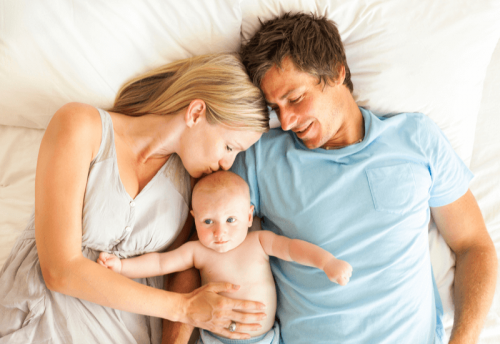Everything You Need to Know about Sex after Having a Baby

The frequency of sexual intercourse tends to diminish during the third trimester of pregnancy. What’s more, picking things back up after the birth of a baby is no simple task.
This isn’t due solely to the physical rehabilitation that the bodies of new mothers need. It’s due to the fact that newborn babies require a great deal of attention.
After carrying a baby for nine months and giving birth, your body needs to recover. This normally takes between 4 to 6 weeks. The postpartum period is one of fatigue, physical pain and emotional changes. Regaining balance in all of these areas can take some time.
In general, there is no danger in restarting your sex life after giving birth, barring some major complication. It’s best to allow things to happen without pressure, and to wait until the mother feels ready both physically and mentally. In this sense, it’s important for women to take the time they need for this transition.
Sex after having a baby: Everything you need to know
Both mothers and fathers can feel less interested in sex after the birth of a baby. Finding a new balance is key. The couple needs to take into account the emotions, energy level and physical changes of both parties. And of course, keep in mind that both are parenting a new baby.
The emotional and psychological aspect in women – and men – can require several weeks to reach a new balance. During pregnancy, both parents have nine months to adapt to the mother’s new body image. However, after birth, the change is much more abrupt.
The typical reorganization of hormones during the first weeks after birth also seems to work against sexual intimacy. New mothers often experience both moments of sadness and apathy. All of these feelings get mixed up in the new mother’s head and make it difficult for the couple to connect.
The decrease in estrogen and the increase in prolactin – the hormone that promotes lactation – can produce a loss of sexual desire. What’s more, they also contribute to vaginal dryness.

Causes that influence sex after giving birth
These are some of the facts that directly influence the resumption of physical activity after the birth of a child:
- Pain
For some mothers, sex can be very painful after having a baby. Generally, this pain is due to suture stitches. It’s very normal for the perineal region to remain tender and sensitive for quite a while after scaring.
- Exhaustion
Caring for a baby 24 hours a day is exhausting both physically and emotionally. When mom and dad finally go to bed, the only thing they want to do is sleep!
- Body image
Many women don’t feel attractive after having a baby. As a result, their sex drive goes down. If this is your case, don’t worry. Getting back your figure might take a little time.
“As happens with memory, if sex is not used, it disappears”
–Eduardo Punset–
When is it okay to have sex after giving birth?
There is no defined time for resuming sexual activities after having a baby. On a medical level, there’s no reason you can’t have intercourse just a few days after giving birth.
However, bleeding can last up to 2 to 4 weeks. That, as well as fatigue and pain from a possible episiotomy can push sexual relations back much further.
On occasions, couples wait several weeks or even months to have their first sexual encounter after the birth of their child. In fact, abundant bleeding and vaginal dryness can be quite an obstacle for resuming sexual activity.
Of course, it’s best not to wait too long. Fears and tension can build up and create distance between partners.
To keep this from happening, the key is to maintain good communication and physical contact. Massage, compliments, and kisses can help to keep the connection alive, and can lead to sexual desire when the time comes.
Loss of sex drive: Why does it occur?
With the arrival of a new baby, all women experience some level of decreased sex drive due to hormonal changes. This can last from 4 to 5 weeks after giving birth.
There are several factors that can add to loss of libido, which we’ll mention below:
- Babies take up a lot of attention: The new responsibility requires parents’ constant presence.
- Vaginal dryness: The same hormones that stimulate milk production can also produce vaginal dryness.

- Painful scars: The scars left behind by episiotomies and C-sections are often painful, and moms may be afraid that sexual activity could make the pain worse.
- The mother may not feel good about herself: First-time mothers are often concerned about their physical appearance and may feel less attractive after pregnancy.
- The father may feel rejected or replaced: Becoming a father can also have an effect on a man’s sex drive and he may feel less inclined to have sex.
- Guilty feelings on behalf of the father: The baby’s father may feel the desire to restart sexual activity, but fear hurting the mother.
Without a doubt, sex after having a baby is a process that requires a small transition. If you’re still having a hard time restarting sexual activity despite the above advice, we recommend you speak with your gynecologist.
Your doctor will help you determine if there is some physiological problem that may be affecting your desire.
All cited sources were thoroughly reviewed by our team to ensure their quality, reliability, currency, and validity. The bibliography of this article was considered reliable and of academic or scientific accuracy.
- Byrd JE, Hyde JS, DeLamater JD, Plant EA. (1998). Sexuality during pregnancy and the year postpartum. J Fam Pract. 1998 Oct; 47(4):305-8.
- Enderle, C. D. F., Kerber, N. P. D. C., Lunardi, V. L., Nobre, C. M. G., Mattos, L., & Rodrigues, E. F. (2013). Condicionantes y/o determinantes del retorno a la actividad sexual en el puerperio. Revista Latino-Americana de Enfermagem, 21(3), 719-725. http://www.scielo.br/scielo.php?pid=S0104-11692013000300719&script=sci_arttext&tlng=es
- Gómez Cantarino, S., & Moreno Preciado, M. (2012). La expresión de la sexualidad durante la gestación y el puerperio. http://rua.ua.es/dspace/handle/10045/24154
- González Labrador, I., & Miyar Pieiga, E. (2001). Sexualidad femenina durante la gestación. Revista cubana de medicina general integral, 17(5), 497-501. http://scielo.sld.cu/scielo.php?script=sci_arttext&pid=S0864-21252001000500015